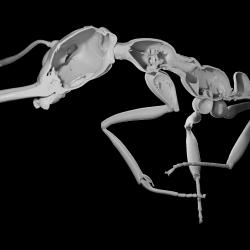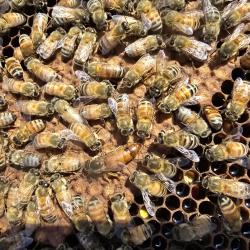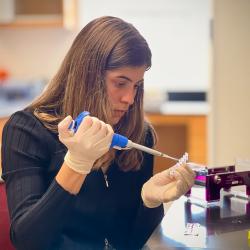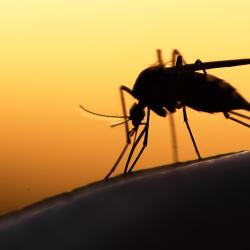You Can Help Save the Bees
UMD crowdfunding campaign supports early warning systems for beekeeper hives
You walk into the grocery store and the produce and dairy shelves are empty. This frightening scene could happen to you if all of the foods that come from plants dependent on honey bees and other pollinators were removed from the shelves.
Honey bees are important pollinators—they’re responsible for every third bite we eat and their pollination efforts are valued at $15 billion annually. But they are currently threatened by a changing agricultural landscape. For several years, beekeepers have experienced high annual colony losses, which endanger our food supply.
To alert beekeepers of escalating health problems in their hives in real time, University of Maryland researchers are launching a sentinel hive program throughout the state of Maryland. Sentinel hives act as early warning systems by alerting beekeepers of trouble in time for them to intervene prevent further damage to bee colonies.
Through a new crowdfunding program at the university called Launch UMD, the researchers hope to raise $8,000, which will support the construction, placement, monitoring and data analysis of eight sentinel hives across the state. The hives will allow beekeepers to step in before colonies reach a critical tipping point, staving off colony losses.
“With our citizen science project, we want to provide beekeepers with real-time data on the health of their colonies that they can use to drive their hive management practices and ultimately improve the health of their honey bee colonies,” said Dennis vanEngelsdorp, assistant professor in the Department of Entomology.
The sentinel hives will monitor honey bee health in real time using scales and traps. The scales will measure colony weight gain or loss. Weight changes are an indicator of food availability, reflected in the flow of nectar—the main carbohydrate source of bees. The traps will collect pollen the bees bring back to the hive that the researchers analyze to determine which plants the bees are pollinating. The team will also regularly assess the hives for varroa mites and diseases.
“The health of a colony is directly linked to the food the bees collect. When bees can’t find flowering trees and plants, the colony uses its food stores and the colony loses weight. Just as we are more likely to get sick when stressed, bees can’t fight infections well when under nutritional stress,” said Kirsten Traynor, a research associate in the Department of Entomology.
The research team believes the sentinel hives will offer valuable information to beekeepers that will allow them to intervene before major colony losses occur. Students working in vanEnglesdorp’s lab will analyze colony weight data to map the patterns of nectar flow. The data will be automatically transmitted to computers on the College Park campus. This information will be also made available to other beekeepers and to the public. The students will also be involved in analyzing the collected pollen and monitoring the hives for disease.
The team’s crowdfunding campaign runs through October 22. You can support the team at any time by visiting ter.ps/bees.
Crowfunding page
Dennis vanEngelsdorp home page
Bee Informed Partnership
Related articles:
Lower Winter Losses, But Tough Times Linger For Honey Bees (May 2014)
On-farm study: common chemicals harm honey bees' health (July 2013)
University of Maryland
College of Computer, Mathematical, and Natural Sciences
2300 Symons Hall, College Park, Md. 20742
www.cmns.umd.edu
@UMDscience
About the College of Computer, Mathematical, and Natural Sciences
The College of Computer, Mathematical, and Natural Sciences at the University of Maryland educates more than 7,000 future scientific leaders in its undergraduate and graduate programs each year. The college's 10 departments and more than a dozen interdisciplinary research centers foster scientific discovery with annual sponsored research funding exceeding $150 million.







